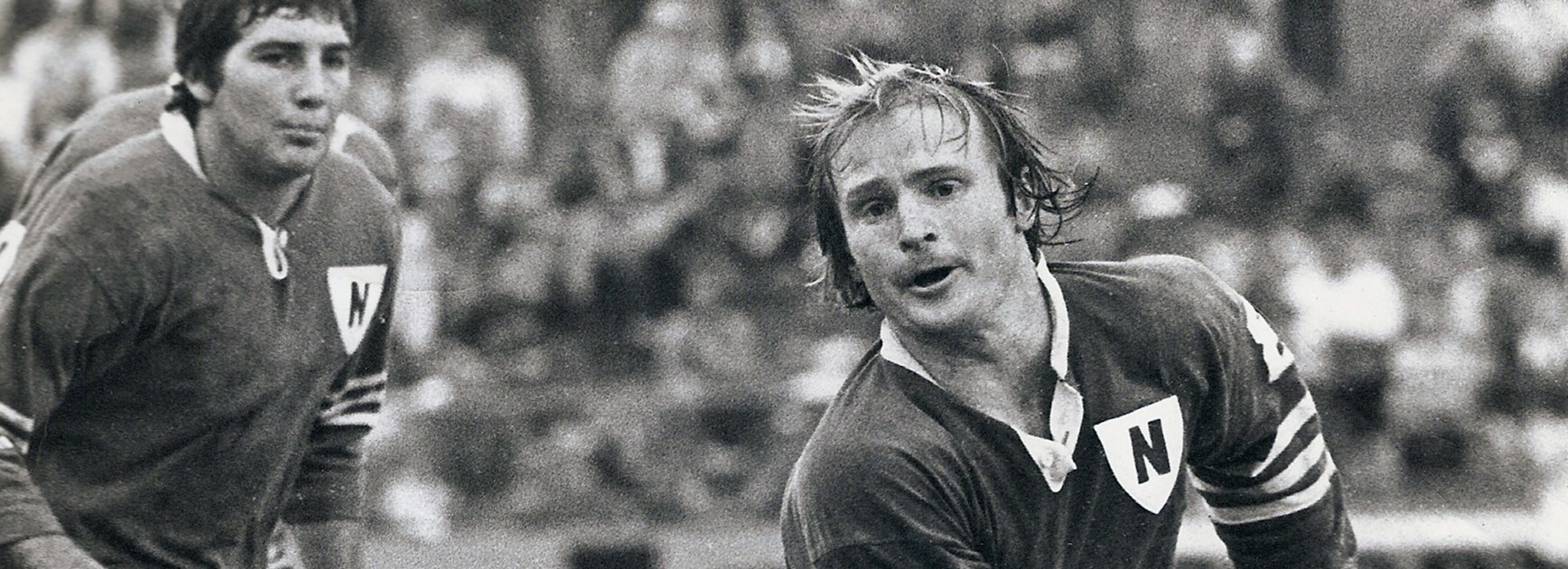
As part of a series of features that NRL.com will be publishing from the Rugby League Week archives, rugby league journalist Neil Cadigan looks back at his 1985 article "Life in a Bangkok Dungeon" about former Newtown five-eighth Paul Hayward. Read the original article here.
I wrote at the time that sitting inside the notorious Bang Kwang jail, Asia's most notorious hellhole, with former representative player but by then convicted drug criminal Paul Hayward was the "the saddest most emotional interview I have ever conducted".
More than 33 years later that still holds true.
It was a simply written story for Rugby League Week magazine in which I described what I saw, what was said and how I felt when I visited the former Newtown half/lock in Bangkok in April 1985.
It was the "how I felt" that caused a chain reaction of readers, and general rugby league reaction, that I never anticipated or was prepared to receive.
It makes this "story behind the story" that I have been asked to write an extraordinary yarn, although it pales in comparison to the sad tale of the poor decision of Paul Cecil Hayward in October 1978 after he told his wife Gail he was off to America with his Newtown Jets teammates for their end-of-season trip when he was really heading to Bangkok with courier Warren Fellows for a heroin deal.
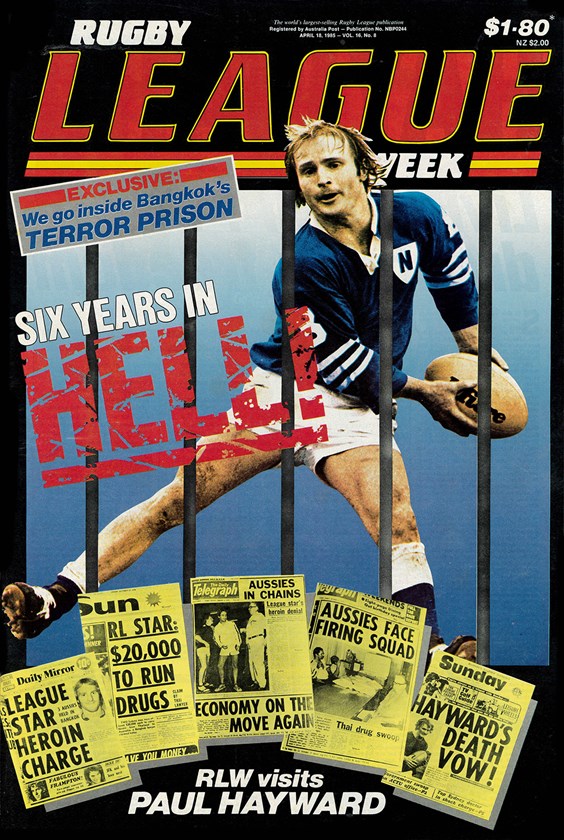
Let's preface Hayward's story for the many who would not be familiar with it.
The pugnacious blond Paul Hayward, who weighed just 65kg, played 78 first-grade games from Newtown from 1973-78 and was good enough to be chosen in a Combined Sydney team that toured New Zealand in 1976. He was also a talented boxer who, after an amateur career that reportedly had him in contention for Olympic selection, turned pro and was unbeaten in eight fights before his life as he knew it was turned on its head.
On the night of October 11, 1978 – acting on a tip of a local whistle-blower – police burst into Hayward's room at the Montien Hotel in Bangkok and seized a briefcase full of 8.4kg of heroin.
Hours earlier Hayward had asked his fellow accused, and confessed courier, Warren Fellows to collect the briefcase because he was nervous having it in his possession. They fell asleep and the switch never happened.
The day before, Parramatta Eels players were in Bangkok for their end-of-season trip away and ran into Hayward as a local bar and spoke with him, some asking why he wasn't in America with the Jets.
The next day Australia learned why, with headlines and photos splattered of Fellows, Hayward and the Bangkok connection William Sinclair bound in chains or sitting at a table with the unpacked plastic bags full of white substance stacked in front of them.
Hayward said he was essentially in Bangkok as a "minder" for those involved in the drug transaction.
"I was only there so Warren wouldn't get burned," he told me. In a book about the episode released years later, Fellows backed up those claims.
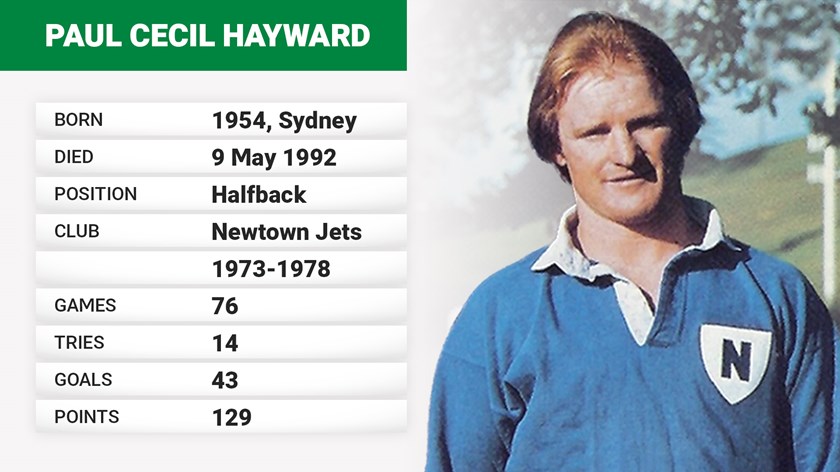
Hayward then was not a drug user. He told me he was offered (from memory) $20,000 – three season's football earnings – to accompany Fellows on the trip.
Fellows revealed in his book that notorious criminal Arthur "Neddy" Smith organised the deal. Smith was in a de facto relationship with Hayward's sister-in-law, and that is how they met.
After constant delays, it took until July 1981 before Hayward, Fellows, Sinclair and taxi driver Kitty Imsap were sentenced. Hayward received 20 years, lighter than the others because "he was used by the narcotics syndicate" while the other three were sentenced to 33 years and eight months each (Hayward and Fellows later had two years added to their sentence after being caught with heroin inside Bang Kwang).
In May 1992, Sinclair won an appeal in Thailand's Supreme Court although it as alleged, which mirrors Thailand's corrupt prison and legal system, he paid for his freedom.
After initially being interned in Bangkok's Klom Prem prison, Fellows and Hayward were moved to Bang Kwang, ironically nicknamed "The Bangkok Hilton" because of its harsh conditions.
It was October 1984 when I ran the idea past RLW editor Ian Heads, a great mentor of mine, of me visiting Bangkok to seek an interview with Hayward who was an infamous but very much forgotten figure.
I later learned former Eels and Rabbitohs player and future successful coach, Graham Murray, was Hayward's last visitor the previous October while "Muz" was on the way home from a world trip.
It was hardly a regulation league story (as I was to cruelly find out) but, I thought, a valid human interest one. Headsy was very supportive.
I had to navigate a maze of red tape and eventually made an official request, with our publisher's backing, to visit Hayward for the purpose of an interview. When we broke in early December for our eight-week annual holidays, I'd heard nothing back.
And the bureaucratic silence continued until the following March when I received a letter from the Australian Embassy in Bangkok saying it had relayed my request to Hayward (and I think a personal letter to him) and he had agreed to it.
All I needed to do was to fly to Bangkok, visit the embassy to get the required paperwork to enter Bang Kwang and then ask to speak with him.
There came a warning with the approval, there was no guarantee he would be fit to speak, nor was a particular day scheduled. I was to just rock up and do my best.
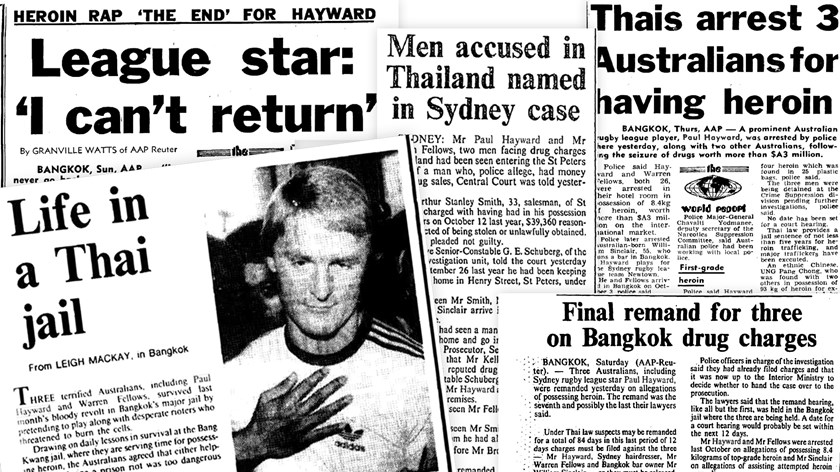
Weeks later I set off to the terrible heat and humidity of Bangkok for a virtual mystery tour, unsure of what I would find.
Armed with my embassy papers, I ventured to the jail and waited and waited for the former football star to emerge, fearing it may become a wasted exercise.
Eventually he walked out.
The accompanying story, under the cover headline "Six Years in Hell", tells of the result.
Hayward – looking fit, with clean, bouncy hair and nervousness but energy in his body - was lucid, repentant, forthcoming and emotional. I left him with two pairs of sports shoes, t-shirts and joggers and some of my own money and returned to my hotel room.
The site of the oppressive jail conditions, watching a human bullock train of Thai men on death row parade past me, and a deep dismay of how anyone could consider smuggling drugs through Thailand knowing the consequences of being caught that left me so restless that I was up at 4 o'clock the next morning.
I took out my portable typewriter and knocked out the 2500-word expose before heading down for breakfast.
On my return to Sydney I visited Hayward's wife Gail who had two children and was four months pregnant with their third, a daughter, when her husband was jailed. Her story was run as a sequel to the Paul Hayward feature in the magazine.
Two unexpected but compelling things happened after publication that was preceded by an advertising campaign on Channel 9, which led to that particular RLW issues being one of the most read.
One was a telephone call from a good first grade centre-winger of the 70s, Peter van Gulik, who was a Qantas flight steward. He had read my story and was prompted to call to tell me he had been somehow compelled to visit Hayward for the first time after many times stopping in Bangkok.
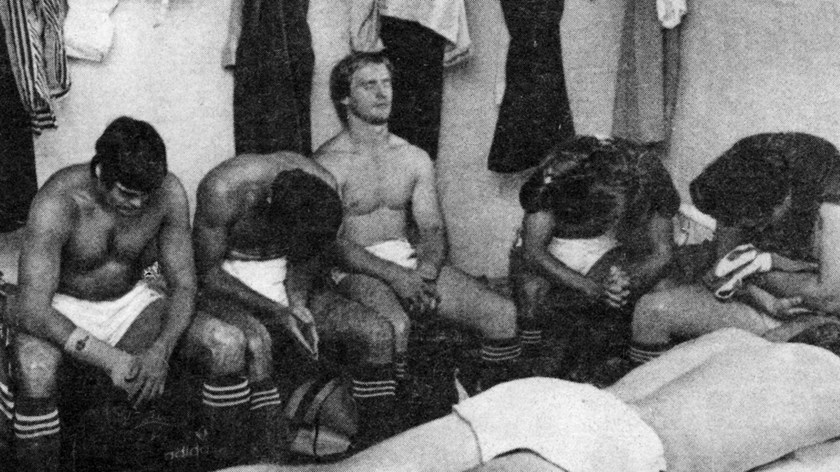
He told me Hayward was virtually non-comprehensible, his hair was shaved and van Gulik's visit lasted just minutes. I asked when he was there. It was Good Friday, the day after I had been with Hayward.
My view is Hayward had steeled himself for weeks to put on a good impression and brave front for my visit for the representation of his life back home and had stayed clean of the drugs that infested Bang Kwang. Then he immediately hit the floor when that mission was completed.
The second major outfall was the varied reader response to the story dictated through letters to the editor - more than 100 – many of which RLW published. The first batch was bitterly negative, with some refusing to buy the magazine again because my story had "glorified a drug runner".
The general theme was there was no room for such a non-football story in a rugby league magazine, that I was too sympathetic to Hayward. Often cited was one particular paragraph I wrote: "OK, he is branded a drug runner, a criminal. Some may say 'let him rot in hell'. But he is paying dearly. He is repentant. He knows he did wrong. And for Christ's sake, he's a human being and was once a good, gutsy footballer."
With the hindsight of age and wisdom, I realise how naive those comments were. But it was borne from the immediate emotion of my experience.
One of the most impassioned letters came from Margaret Barrett, from Temora in NSW, who spoke of a son who was an avid league follower (and handy young player) who looked forward to reading the magazine each week and that he should not have been confronted with such an unsavory story. She is the mother of Trent Barrett.
In response to the scathing letters came more favourable ones from people stating their main impression of the story was it emphasised the life-destroying fate that would befall anyone stupid enough to peddle drugs and had left them with an anti-drugs message.
Months later the very strong (at the time) organisation, the National Sports Writers Association, held a gala dinner in Sydney to announce Australia's sportswriter of the year from submitted stories. The Hayward story was a nomination.
I was fortunate to win the award and dedicated it to my best mate who had died the previous Christmas Eve while his wife, like Gail Hayward, was four months pregnant.
However, my award alienated the sports writing industry. I was told one of the judges, esteemed Sydney sports media stalwart Mike Gibson, was livid such a story was recognised ("it's not a sport story"). Others then, and to this day, regarded it in a far more elevated regard (which I am very thankful for).
Certainly it was a unique, unconventional, powerful yet a breakthrough story at that time (journalistic dark ages when we look back now).
The footnote is a tragic one.
Hayward never recovered from an ill-fated, illegal decision that he poorly conceived as an innocent grab for quick cash.
Hayward's loyal wife talked about the uncertainty she might face if Paul ever returned, considering how differently their lives had changed. "I suppose I worry about Paul. What he may do. If for some reason we don't hit it off, he might think 'I've lost my wife, my kids, my football career – for what'?"
He did return, in April 1989 – 10 and a half years after having a .38 police pistol held to his temple in his Bangkok hotel. He'd received a pardon for his good behavior by the king of Thailand as part of his 60th birthday celebrations. Earlier it had been reported Hayward had tested HIV positive due to using a contaminated heroin syringe while in jail.
One day at my work (I had left RLW and was a News Limited suburban newspaper executive) I received a call from Paul Hayward and he asked to catch up for a beer. I admit I was hesitant for some reason (which I regret now) and was preparing to leave Australia four weeks later to become general manager of the Wakefield Trinity club in England, planning to leave my sports writing days behind.
In May 1992, Gail's fears had come true. Struggling emotionally and unable to assimilate back into Sydney life and reconnect with friends, Paul had overdosed from heroin in the family bathroom and was dead at age 38.
I was back in Australia by this time and his former Newtown teammate Phil Sigsworth called to advise me of Hayward's death. "Siggy" told me he had seen his mate at the Erskineville Hotel just hours earlier and bought him two beers. He said Hayward seemed more positive than he had been for some time, was working at a garbage disposal company and Sigsworth felt new hope for him.
In reality, Hayward never recovered from an ill-fated, illegal decision that he poorly conceived as an innocent grab for quick cash.
Yet, while it ultimately cost him his life, the thwarted deal may have saved the lives of recipients of the 8.4kg of heroin. And that has to be stated.
Footnote: A publisher offered me the opportunity to co-author Warren Fellows's book about his experiences (republished under the title "Damage Done") but I declined. It is a best-seller.
